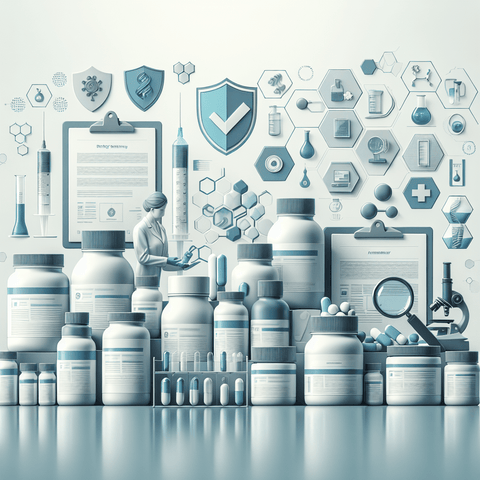Introducción
A medida que más personas toman el control de su salud y bienestar, el mercado de suplementos dietéticos y nutricionales sigue creciendo rápidamente. Sin embargo, a diferencia de los medicamentos farmacéuticos, los suplementos no son revisados rigurosamente por organismos reguladores antes de llegar a las estanterías de las tiendas. Esta falta de supervisión obligatoria deja espacio para variabilidad en calidad, potencia, pureza y seguridad. Esto lleva a muchos consumidores a hacerse una pregunta crítica: ¿Cómo puedo estar seguro de que los suplementos que tomo contienen lo que afirman y son seguros para consumir?
Una respuesta cada vez más esencial a esta pregunta se encuentra en la práctica de pruebas de terceros. En el contexto de los suplementos dietéticos, las pruebas de terceros se refieren a laboratorios independientes e imparciales que analizan el contenido y la calidad de un producto. Estos laboratorios no están asociados con el fabricante o vendedor del suplemento y, por lo tanto, proporcionan una evaluación imparcial de la formulación del producto. Estas pruebas aseguran que los consumidores obtengan exactamente lo que está en la etiqueta—ni más ni menos.
Desde preocupaciones sobre etiquetado inexacto hasta la posible presencia de contaminantes, la necesidad de pruebas externas nunca ha sido más apremiante. Sin mecanismos de pre-aprobación gubernamentales en vigor, los consumidores deben confiar en la ética y diligencia de los fabricantes de suplementos. Por eso, seleccionar suplementos con credenciales verificadas de terceros es una de las decisiones más inteligentes que puedes tomar para tu salud y seguridad.
En esta publicación de blog integral, desglosaremos qué significa pruebas de terceros en el contexto de los suplementos, exploraremos los estándares y certificaciones que debes buscar, explicaremos los procesos de prueba utilizados y destacaremos cómo esto se traduce en productos más seguros y confiables. Al final, entenderás exactamente por qué las pruebas de terceros son importantes y cómo protegen tu bienestar e inversión.
¿Qué Son las Pruebas de Terceros para Suplementos?
El término pruebas de terceros para suplementos describe una medida esencial de garantía de calidad que separa las marcas de suplementos confiables del resto. Aunque la mayoría de las empresas de suplementos realizan procedimientos internos de control de calidad, las pruebas internas solas no garantizan imparcialidad. Los laboratorios internos, aunque útiles, pueden verse obstaculizados por posibles conflictos de interés e inconsistencias en los procedimientos o estándares de laboratorio.
Aquí es donde entran en juego las pruebas de terceros. Las pruebas de terceros son realizadas por laboratorios que operan independientemente de la empresa o marca de suplementos. Estos laboratorios no tienen vínculos financieros u operativos con los fabricantes, lo que los convierte en evaluadores confiables de la calidad, pureza, potencia y seguridad del producto.
Las marcas de suplementos que invierten en pruebas de terceros demuestran transparencia y compromiso con altos estándares. Estos laboratorios independientes verifican varios atributos clave del producto, incluyendo:
- Que los ingredientes listados estén presentes en las cantidades correctas
- No hay contaminantes dañinos (como metales pesados o microbios) presentes
- Las etiquetas son precisas y no engañosas
Algunas de las organizaciones de terceros más respetadas en el espacio de pruebas de suplementos incluyen:
- NSF International – Reconocido por sus rigurosas pruebas y certificación de suplementos dietéticos, especialmente aquellos destinados a atletas
- United States Pharmacopeia (USP) – Establece estándares públicos oficiales para suplementos dietéticos en EE.UU., asegurando consistencia, identidad, potencia y pureza
- ConsumerLab.com – Prueba independientemente suplementos populares y publica los resultados en su sitio web
Las marcas presentadas en Topvitamine.com a menudo se involucran con estos certificadores de terceros o cumplen con estándares de prueba establecidos por organismos igualmente rigurosos. Los fabricantes reputados que ofrecen vitamina C, suplementos de omega-3 o productos de magnesio adoptan comúnmente las pruebas externas como una medida estándar de control de calidad para fortalecer la confianza del consumidor.
En última instancia, las pruebas de terceros representan más que solo un compromiso con la seguridad; es una práctica industrial óptima que distingue a las marcas creíbles y centradas en la salud de aquellas que simplemente buscan ventas. Asegura que lo que está en la etiqueta realmente refleja lo que está en la botella—sin sorpresas dañinas.
La Importancia de las Pruebas Independientes de Suplementos para la Confianza del Consumidor
La confianza es la base de cualquier decisión de salud del consumidor. En una industria donde la regulación es limitada y el marketing a menudo puede ser engañoso, las pruebas independientes de suplementos sirven como un mecanismo vital de construcción de confianza entre las marcas y los compradores.
Para considerarse “independiente,” un laboratorio debe no tener afiliación con la empresa del suplemento. Esta separación permite al laboratorio reportar hallazgos sin influencia o presión del fabricante. Sus conclusiones se basan puramente en evidencia científica derivada de metodologías de prueba rigurosas como cromatografía líquida de alto rendimiento (HPLC), cromatografía de gases y ensayos microbiológicos.
¿Por qué importa esto? Desafortunadamente, varios estudios e investigaciones noticiosas han expuesto inconsistencias significativas entre lo que las etiquetas de los suplementos afirman y lo que sus contenidos realmente entregan. Por ejemplo:
- Un estudio de 2015 de la oficina del Fiscal General de Nueva York encontró que más de la mitad de los suplementos botánicos probados no contenían los materiales vegetales anunciados en sus etiquetas
- ConsumerLab ha encontrado repetidamente que los polvos de proteína pueden variar drásticamente en contenido real de proteína, con algunos productos conteniendo mucho menos de lo reclamado o estando contaminados con metales pesados
Estos ejemplos destacan la necesidad urgente de que partes independientes verifiquen la precisión de las etiquetas. Sin tal escrutinio de terceros, los consumidores corren el riesgo de ingerir ingredientes no probados o incluso inseguros. A cambio, las marcas que abrazan las pruebas independientes ganan una ventaja competitiva—asegurando a los clientes su compromiso con la seguridad y la integridad.
Sitios web como Labdoor y ConsumerLab han aprovechado la creciente demanda de esta transparencia. Al publicar resultados de pruebas independientes, permiten a los consumidores evaluar la calidad de los suplementos en áreas clave como precisión de ingredientes, pureza y valor.
Los consumidores deben buscar activamente marcas que divulguen pruebas de laboratorios independientes o cuenten con certificaciones en sus etiquetas. Los suplementos encontrados en Topvitamine.com—algunos de los cuales incluyen fórmulas bien consideradas de vitamina K y magnesio—frecuentemente proporcionan descripciones detalladas de los productos que incluyen certificaciones o verificaciones de terceros como testimonios de su autenticidad.
En un entorno comúnmente no regulado, las pruebas independientes de suplementos convierten una compra potencialmente turbia en una fundamentada en confianza, claridad y control—empoderándote para tomar decisiones de salud informadas basadas no en el bombo, sino en datos sólidos.
Calidad Certificada de Suplementos: Qué Certificaciones Buscar
Al explorar el mundo de los suplementos dietéticos, ver palabras como "probado en laboratorio," "verificado" o "certificado" en una etiqueta de producto puede ofrecer una sensación de seguridad. Pero, ¿qué significa realmente "calidad certificada de suplementos"? ¿Y qué logotipos o sellos deberías buscar para verificar esa calidad?
La calidad certificada de suplementos implica que un producto cumple con estándares predefinidos establecidos por cuerpos de prueba y regulación creíbles. No se trata solo de hacer una afirmación de salud o imprimir un empaque atractivo—es una prueba de que el suplemento ha pasado por evaluaciones rigurosas para confirmar que cumple con criterios establecidos relacionados con seguridad, potencia y pureza.
Hay varias organizaciones de certificación confiables que establecen (y confirman) estos puntos de referencia:
- USP Verificado: Emitido por la United States Pharmacopeia, esta certificación asegura a los consumidores que el producto contiene los ingredientes listados en la etiqueta, en la potencia declarada, y sin niveles dañinos de contaminantes.
- NSF Certificado para Deporte: Especialmente relevante para suplementos deportivos, este sello confirma que el suplemento está libre de sustancias prohibidas y cumple con estándares de calidad, seguridad y pureza.
- Certificado GMP: Aunque no es una certificación de prueba, este sello muestra que el producto fue producido en una instalación siguiendo Buenas Prácticas de Manufactura (GMP), lo que asegura calidad de producto consistente y minimiza el riesgo de contaminación.
Vale la pena entender la distinción entre "certificado" y "probado." Un suplemento "probado" puede haber pasado por algún análisis, pero a menos que pase y cumpla con todos los criterios establecidos por un organismo reconocido, no obtendrá una certificación. La certificación implica pasar toda una batería de evaluaciones realizadas por una institución reputada.
Para asistir a los consumidores, la mayoría de los suplementos certificados cuentan con marcas visibles o sellos en la etiqueta. Busca sellos que incluyan acrónimos como USP, NSF o GMP, a menudo acompañados por el nombre del organismo certificador.
Las marcas listadas en Topvitamine.com frecuentemente cuentan con tales certificaciones. Ya sea que estés buscando suplementos de omega-3 para apoyo cardiovascular, o buscando una fuente limpia y efectiva de magnesio, probablemente encuentres opciones que exhiben orgullosamente estos sellos confiables—indicadores de mayor seguridad del consumidor y responsabilidad del fabricante.
En un mercado saturado de afirmaciones de marca no comprobadas, las certificaciones de terceros ofrecen una rareza: confianza validada. Al elegir solo suplementos certificados, no solo estás comprando un producto—estás invirtiendo en calidad comprobada, respaldada por ciencia y ética.
Estándares de Prueba de Suplementos: Entendiendo Qué Se Está Midiendo
Al elegir un suplemento, afirmaciones como "probado por pureza" o "potencia validada" son tranquilizadoras. Pero, ¿qué implica realmente este tipo de estándar de prueba de suplementos? Comprender qué se evalúa en cada prueba te ayuda, como consumidor, a captar el verdadero significado detrás de los logotipos de certificación y las afirmaciones de calidad.
Aquí están los principales estándares evaluados durante las pruebas de suplementos de terceros:
- Identidad del Ingrediente: Confirma que el ingrediente listado en la etiqueta está realmente presente en el producto.
- Potencia: Mide la fuerza y concentración de compuestos activos para asegurar eficacia dentro de niveles de tolerancia.
- Pureza: Evalúa si el suplemento está libre de sustancias no deseadas como contaminantes, contaminantes cruzados o rellenos artificiales.
- Pruebas Microbianas: Examina la presencia de bacterias, levaduras, mohos u otros microbios que podrían representar riesgos para la salud, especialmente en individuos inmunocomprometidos.
- Examen de Metales Pesados: Busca contaminantes comunes como plomo, mercurio, cadmio y arsénico—especialmente relevante en productos herbales y de origen marino.
Diferentes laboratorios y organizaciones de certificación adhieren a diferentes puntos de referencia. Por ejemplo, los estándares de USP se consideran algunos de los más estrictos en EE.UU., y los productos que los cumplen ofrecen a los consumidores una calidad más confiable. Por otro lado, los procedimientos básicos de control de calidad internos pueden ser suficientes para marcas que no priorizan estos elevados puntos de referencia.
Otro factor que los consumidores deben reconocer es el valor de las pruebas consistentes de lotes. La calidad no depende solo de la primera producción. El análisis continuo de diferentes lotes de productos ayuda a asegurar que la estabilidad y calidad permanezcan uniformes a lo largo del tiempo.
Muchos suplementos ofrecidos en Topvitamine.com se crean teniendo en cuenta estos estándares industriales. Los suplementos de vitamina C, por ejemplo, son sometidos regularmente a pruebas microbiológicas y exámenes de metales pesados para asegurar que estén libres de contaminantes que podrían afectar su eficacia o representar riesgos para la salud.
Comprender estos estándares de prueba de suplementos también te empodera para separar productos genuinos y de alta calidad de aquellos que simplemente usan palabras de moda. La verdadera seguridad no reside en lo que las marcas afirman, sino en lo que los laboratorios certificados prueban.
Por Qué la Verificación de Laboratorios de Terceros Es un Sello de Suplementos Premium
Entre todos los métodos de control de calidad en la industria de suplementos, la verificación de laboratorios de terceros destaca como el estándar de oro para probar la integridad del producto. Va más allá de las afirmaciones de marketing para proporcionar evidencia irrefutable de que un suplemento cumple con estándares objetivos de seguridad y potencia.
La verificación de laboratorios de terceros implica enviar una muestra del producto—generalmente de un lote aleatorio—a un laboratorio certificado. Usando técnicas como cromatografía líquida de alto rendimiento (HPLC), espectrometría de masas, espectroscopía infrarroja y ensayos microbiológicos, estos laboratorios proporcionan un informe de verificación detallado.
Ciertas categorías de suplementos se benefician particularmente de la verificación de laboratorios de terceros, incluyendo:
- Polvos de proteína, que pueden ser adulterados con rellenos o dosificar por debajo del contenido de proteína indicado en la etiqueta
- Probióticos, donde la viabilidad y la identidad de la cepa son cruciales pero difíciles de medir sin herramientas de laboratorio
- Suplementos herbales, que a menudo se encuentran contaminados, mal etiquetados o sustituidos con otras especies de plantas
Además, los suplementos importados de países con reglas menos estrictas a menudo evaden los umbrales de seguridad domésticos. La verificación independiente de laboratorios es especialmente importante para examinar la seguridad de estas "gangas" importadas.
La validación repetida de terceros asegura el valor de marca a largo plazo. Las marcas premium de suplementos que operan transparentemente construyen relaciones más fuertes con sus clientes. Los consumidores confían en aquellos que someten sus productos a escrutinio imparcial sobre aquellos que dependen únicamente de empaques llamativos o afirmaciones ambiguas de pureza.
Explora la selección de productos premium y verificables en Topvitamine.com, como vitamina K o suplementos de omega-3, para encontrar opciones validadas por terceros que priorizan tu bienestar y confianza.
El Valor del Análisis Imparcial de Suplementos en un Mercado No Regulado
La industria global de suplementos opera con supervisión regulatoria limitada. Si bien los fabricantes en muchos países deben adherirse a Buenas Prácticas de Manufactura (GMP), la mayoría de los suplementos no son revisados por agencias gubernamentales por eficacia o seguridad antes de llegar a las estanterías de las tiendas. Este vacío regulatorio es donde el análisis imparcial de suplementos se vuelve indispensable.
A pesar de contar con algunos mecanismos de vigilancia post-mercado, agencias como la FDA de EE.UU. o la Autoridad Europea de Seguridad Alimentaria (EFSA) no pre-aprueban suplementos de la misma manera que los medicamentos recetados son evaluados. Como resultado, muchos productos escapan a controles de calidad estrictos a menos que se reporte un problema externo.
Sin pruebas independientes, los consumidores dependen únicamente de la honestidad e integridad de la marca—lo cual lamentablemente no siempre lleva a compras seguras. Ha habido múltiples escándalos que destacan las consecuencias de esta falta de regulación:
- En 2019, ciertos suplementos de pérdida de peso y mejora sexual fueron encontrados conteniendo medicamentos farmacéuticos no declarados.
- Varios productos "naturales" a base de hierbas han sido encontrados adulterados con sintéticos o sustituidos con materiales vegetales no listados, potencialmente interactuando con medicamentos o causando reacciones alérgicas.
El análisis imparcial de terceros es la línea defensiva del consumidor contra este caos. Revela los productos que cumplen lo que prometen—y aquellos que se esconden detrás de marketing sin fundamento.
Al navegar plataformas confiables como Topvitamine.com, los consumidores pueden identificar mejor productos cuyos fabricantes priorizan el análisis de terceros y estándares éticos de producción. Los suplementos desarrollados con escrutinio imparcial no solo priorizan el bienestar público—elevan toda la industria a estándares más altos.
Conclusión: Cómo las Pruebas de Terceros Apoyan Elecciones de Suplementos Más Seguras e Inteligentes
Las pruebas de terceros no son un lujo para los compradores de suplementos—son una necesidad. En un espacio donde las etiquetas engañosas e inconsistencias abundan, las pruebas de terceros ofrecen claridad, seguridad y responsabilidad. Desde corregir afirmaciones de etiquetas inexactas hasta examinar contaminantes, este proceso de verificación imparcial asegura que estás recibiendo lo que la etiqueta promete—y nada más.
Al evaluar un suplemento, prioriza:
- Etiquetas que indiquen certificaciones de terceros (por ejemplo, USP, NSF, GMP)
- Referencias claras a pruebas de terceros en descripciones de productos o literatura de la marca
- Categorías de suplementos donde las pruebas son especialmente cruciales, como polvos de proteína o mezclas herbales
Las marcas presentadas en Topvitamine.com ofrecen muchas de estas opciones—ya sea que estés comprando fuentes de magnesio, antioxidantes ricos en vitamina C o esenciales omega-3s.
Invertir unos minutos adicionales en verificar las certificaciones de un producto puede proteger tu salud, reducir gastos innecesarios y contribuir a un mercado que valora la transparencia sobre el engaño.
Sección de Preguntas y Respuestas
P: ¿Qué significa la prueba de terceros para suplementos?
La prueba de terceros implica que un laboratorio independiente y no afiliado analiza un suplemento para verificar su identidad de ingredientes, potencia, pureza y seguridad. Ayuda a asegurar que el producto coincida con sus afirmaciones de etiquetado.
P: ¿Por qué es importante la prueba de terceros para los usuarios de suplementos?
Actúa como una verificación de calidad imparcial en una industria a menudo no regulada. Las pruebas de terceros ayudan a prevenir la contaminación, la subdosis y el etiquetado engañoso—haciendo que tus elecciones de suplementos sean más seguras y efectivas.
P: ¿Cómo puedo identificar si un suplemento ha sido probado por terceros?
Busca logotipos o sellos de organizaciones de prueba reconocidas como USP, NSF o ConsumerLab. La mayoría de las marcas reputadas también mencionan pruebas de terceros en sus descripciones de productos y empaques.
P: ¿Los suplementos certificados son lo mismo que los suplementos probados?
No. Los suplementos probados pueden haber pasado por un análisis independiente, mientras que los suplementos certificados han pasado evaluaciones rigurosas de organizaciones respetadas, obteniendo prueba de calidad estandarizada.
P: ¿Qué suplementos se benefician particularmente de la verificación de terceros?
Los suplementos con formulaciones complejas o riesgo de contaminación—como polvos de proteína, productos a base de hierbas, probióticos y nutrientes de origen marino como los omega-3—se benefician enormemente de la verificación.
Palabras Clave Importantes
- pruebas de terceros para suplementos
- pruebas independientes de suplementos
- calidad certificada de suplementos
- estándares de prueba de suplementos
- verificación de laboratorios de terceros
- análisis imparcial de suplementos
- suplementos confiables
- seguridad de calidad en suplementos
- cómo se prueban los suplementos
- suplementos dietéticos seguros



